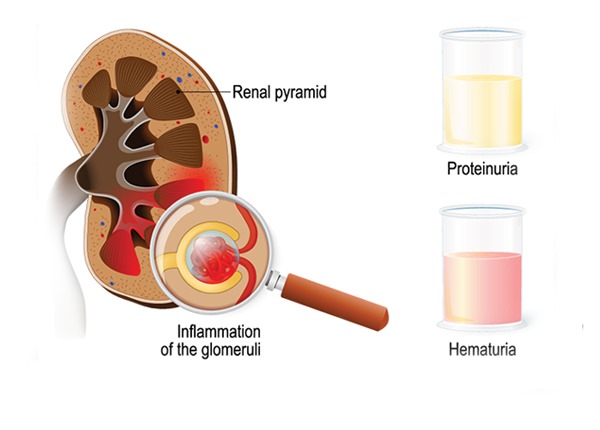
What is glomerulonephritis?
Inflammation of the glomeruli (network of blood vessel) of the kidney results in a condition known as glomerulonephritis. A healthy glomerulus allows waste products and extra water to pass in urine while keeping blood cells and protein in the bloodstream. However in glomerulonephritis, proteins and sometimes red blood cells leak out which is not just the loss but also a cause of fluid accumulation and swelling (edema) in the body.
The nephron is the smallest filtering unit of the kidney. Each nephron comprises of a renal corpuscle and renal tubule. The renal corpuscle, in turn, is formed by the glomerulus and the Bowman’s capsule. The glomerulus is that part of the nephron which removes the waste and excess fluid from the blood. Thus, it has a primary role in filtration. For assessing the functional capacity of kidneys, Glomerular Filtration Rate (GFR) is determined.
Glomerulonephritis may be acute or chronic and may be caused due to a variety of reasons including underlying diseases such as diabetes. If the condition remains untreated and inflammation lasts for a longer period, risk of kidney damage severely increases.
What are the symptoms of glomerulonephritis?
In many cases, glomerulonephritis may remain asymptomatic, and the condition is diagnosed accidentally when blood and urine tests are done for other diseases. Some of the symptoms experienced by the persons with glomerulonephritis include:
- Frothy urine due to proteinuria: Glomerulonephritis alters the filtering function, which leads to an increased level of protein in the urine. A high level of protein in the urine causes frothiness.
- Haematuria: In glomerulonephritis, blood may also leak into the urine. In severe cases, the presence of blood may be determined by naked eyes while in mild glomerulonephritis, tests are conducted to determine the presence of blood in the urine.
- Edema: Proteins are responsible for keeping the fluid in the blood vessels due to osmotic pressure. In case of low levels of proteins, the fluid leaks from the blood vessels and gets accumulated in tissues, leading to edema.
- High blood pressure or hypertension: Kidneys are also responsible for maintaining blood pressure through the secretion of hormones, known as the Renin-Angiotensin system, that regulate the blood pressure. Consequentially, alteration in kidney function due to glomerulonephritis may cause hypertension.
- Lack of energy: Anaemia type symptoms may also occur due to loss of blood. These symptoms include lack of energy and lethargy.
What is glomerulonephritis urinalysis test?
Urinalysis is the comprehensive testing of urine for diagnosis of various diseases and for routine evaluation of kidney health. As glomerulonephritis causes impaired functioning of kidneys, detailed urinalysis is conducted to diagnose the condition. Urine is analyzed for the presence of protein and blood. Other substances that can be evaluated include cellular casts of RBC and WBC, oval fat bodies, acanthocytes, granular casts, dysmorphic RBCs, and differentiated RBC and WBC. Various chemical assays are also the part of glomerulonephritis urinalysis test. These assays include the assay of urine sodium, urine electrolytes, and fractional excretion of sodium.
What are the treatment options for glomerulonephritis?
Aim of treating glomerulonephritis is to prevent the progression of the disease. The treatment is initiated depending upon the cause. Treatment strategy also depends upon whether the condition is acute or chronic and the severity of the disease. Certain changes in the diet and fluid intake is advised by the nephrologist.
If the condition is caused due to infection, treatment should be focused on the management of infection especially in nephrotic syndrome and chronic kidney disease. Vaccinations such as influenza and pneumonia shots are recommended.
- Plasma exchange is suggested for glomerulonephritis called ANCA vasculitis.
- Treatment for underlying causes such as diabetes, high blood pressure, or autoimmune disease.
- Immunosuppressants for glomerulonephritis caused due to immune responses.
- In severe cases of glomerulonephritis with kidney failure, dialysis and kidney transplant may be the only option.
